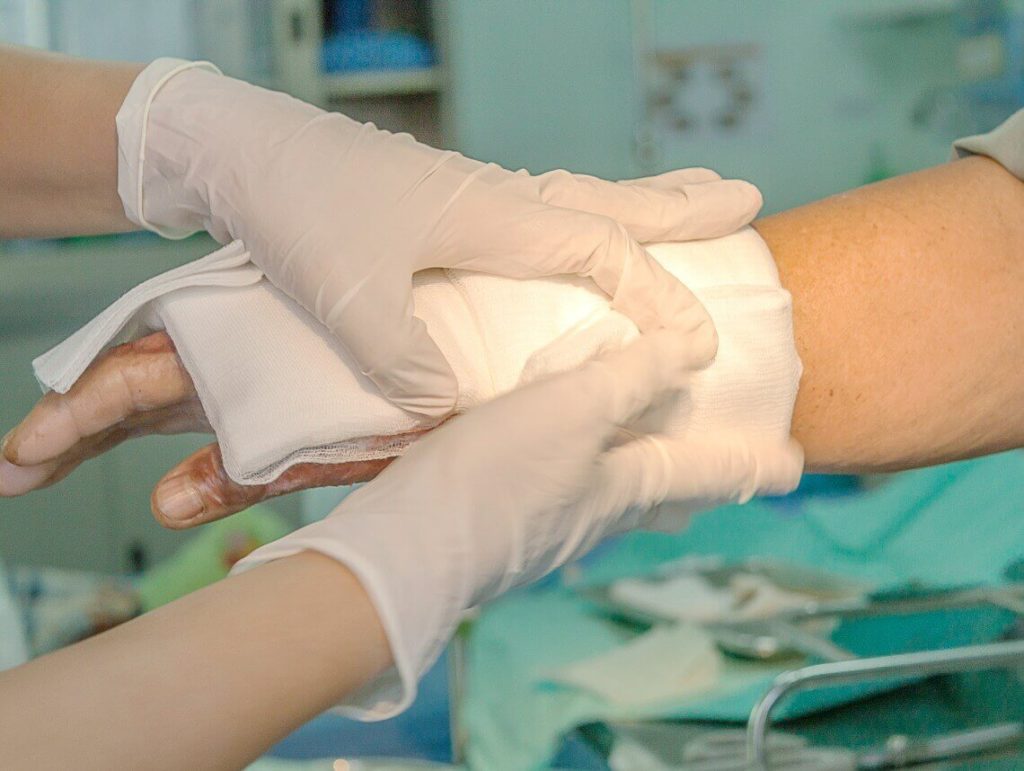What is Wound Care?
Neglecting a wound will prove quite painful and even has the potential to be deadly. Even small and seemingly insignificant wounds should be treated without delay. Wound care is particularly important for senior citizens who have mobility challenges. In particular, those who are bedridden greatly benefit from ongoing wound care. Though there is no guarantee the wound will fully heal in a timely manner, wound care will certainly expedite the healing process and reduce pain.
Wound care is centered on carefully treating the wound and the body site around it to prevent a worsening of the wound and subsequent pain. In some cases, rotating an immobile patient so he or she can shift to one side has the potential to hasten wound care. A specially trained wound care expert provides ongoing care to patients in the home, ensuring those unfortunate individuals do not have to travel to and from a hospital or another medical facility.
Wound care is provided to patients with open wounds. These wounds typically result from excessive pressure, diabetes surgery, trauma or vascular problems. Wound care begins with an analysis of the wound. The wound is then cleaned, debrided and dressed appropriately. If necessary, compression will be applied. The patient will is then educated about wound care, changing the dressing and ongoing therapy. Examples of wound care treatment include pulsed lavage, electrical stimulation, whirlpool and ultrasound mist therapy.
What Wounds can be Treated?
Wound care treats all different types of wounds. If your parent or another senior you care for has any type of wound, be safe rather than sorry by asking our medical professionals if wound care is necessary. Examples of wounds treated include diabetic wounds, chronic wounds, narcotic wounds, unstageable pressure ulcers, venous wounds, surgical wounds and extremity wounds with edema.
Diabetic wound care is particularly common. Diabetic ulcers wear away at the skin, especially along the foot. This wound can quickly develop and lead to an infection. Bedsore wounds are also common after a patient has spent a lengthy period of time resting in bed. Poor circulation has the potential to cause leg ulcers. These are just some examples of wounds treated by a wound care nurse. If you are curious as to how to care for a wound, do the smart thing by requesting a wound analysis to determine if care will be required.
What is Wound Care at Home?
Wound care provided in a patient’s home proactively addresses the open or healing wound. This care is provided by a medical professional who understands exactly how to treat wounds to facilitate timely and effective healing. The best wound care experts provide a multidisciplinary approach in which the wound along with the underlying disease that lead to the wound formation are treated. The patient is educated about wound care throughout the healing process so he or she can help expedite healing that reduces pain and increases quality of life.
The best part about wound care at home is the patient does not have to depart the house to receive assistance. The wound care specialist travels directly to the patient’s home to care for the wound, creating an opportunity for a timely recovery and reducing pain.
If you are uncertain as to whether your wound requires care or if you might be better off with care at a medical facility, ask for guidance. Our wound care experts will perform an honest evaluation of your wound as well as your mobility limitations to get a sense of whether in home care near me or wound care in a professional medical setting is ideal. In general, minor wounds are best treated at home. However, if the patient is immobile, it might be prudent to remain at home rather than travel to and from a hospital or other medical facility for ongoing wound treatment. Most people prefer home health wound care as opposed to resting in a hospital bed for weeks or months.
If the wound is minor, it has the potential to heal surprisingly quickly with professional attention. In some cases, wound care bandages are unnecessary. What matters most is that the wound is kept clean and dry throughout the healing process. If necessary, a pump system similar to those used in hospitals for the treatment of large wounds and chronic wounds will be used in your home. This approach applies negative pressure to the wound throughout the day and night at specific intervals.

Wound Treatments
Let’s shift our attention to how to take care of a wound with at home care near me. Treating a wound is not the type of medical challenge a layman can overcome on his or her own. Though everyday people understand how to apply a band-aid, caring for an open wound or even a healing wound is a unique challenge. The wound care process starts with a wound care plan. Our wound care specialists will tailor care in accordance with your loved one’s needs.
Once a plan is in place, we proceed to cleaning the wound. A dressing is applied to the wound for full coverage. The typical wound benefits from moisture so the wound care specialist is likely to add a moist compress. Additional examples of dressings include foam dressings, hydrocolloid dressings, films and gauze.
The purpose of the dressing is to eliminate excessive fluid from inside of the wound and guard against infection. The dressing remains on the wound for the days ahead. If it is determined the dressing cannot absorb secretions or if the dressing slips, a wound dressing change will be necessary. There is some experimentation involved with wound care as it is impossible to determine which specific dressing will prove ideal for a wound at first glance. The wound care expert will continue to monitor the wound’s progression or regression and alter the dressing accordingly.
Wound treatments are often complemented by medical treatments. The patient’s doctor might perform specific procedures or apply nuanced techniques to help treat the open wound. Once the area is cleaned and numbed, everything from stitches to sutures and skin glue can be added to help close the wound. However, the chances of infection and the specific location of the wound ultimately determine whether it will be closed or if it is better to give it a chance to naturally heal.
If it is determined the wound will benefit from remaining open, secondary intention healing will be allowed to occur. This approach to wound healing allows the base of the wound all the way up to the superficial epidermis to heal as time progresses. However, the wound will still have to be packed with gauze. The subsequent healing process will be challenging yet active wound care management helps to prevent infection and also prevent abscesses from forming.
Your wound care specialists and doctor will help you determine if you can benefit from pain medication throughout the wound care healing process. The doctor might prescribe an antibiotic or penicillin if there is an infection or if the chances of an infection are high. It might also be necessary to perform surgery on the wound and surrounding body site. If the wound is deep, egregiously painful or requires ongoing attention, our private duty nursing service will prove invaluable, providing ongoing monitoring, cleaning and dressing as necessary.


